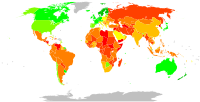
Photo from wikipedia
ABSTRACT This study presents a dual approach towards the political economy of corruption under Turkey’s AKP government by differentiating between petty and grand corruption. Findings illustrate that the AKP has… Click to show full abstract
ABSTRACT This study presents a dual approach towards the political economy of corruption under Turkey’s AKP government by differentiating between petty and grand corruption. Findings illustrate that the AKP has been relatively successful in terms of diminishing petty corruption in Turkey which is demonstrated by improved performance in several business indicators, foreign direct investment, income level, and in decreasing rate of corruption-related crimes. However, the AKP failed to move reforms further to regulate the legal framework of political party and electoral campaign finance, which eventually opened the door for cronyism. The concept of state capture helps to explain how corruption is eliminated in some forms (petty) but reproduced in other forms (grand). However, in contrast to insights provided by the state capture literature, this study finds that it is the ruling political party that increased its influence over business groups rather than de novo firms having more control on political elites.
Journal Title: Turkish Studies
Year Published: 2018
Link to full text (if available)
Share on Social Media: Sign Up to like & get
recommendations!